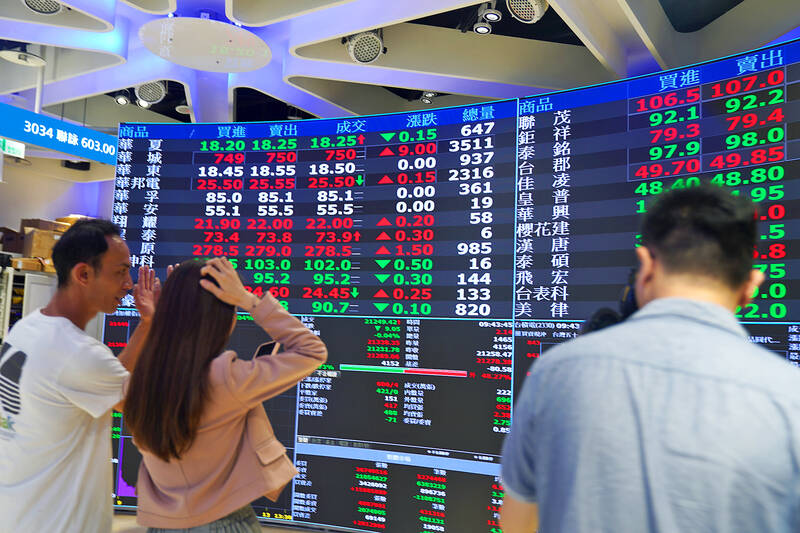The public’s confidence in the economic outlook and stock investment declined slightly this month, but remained positive overall, a survey by Cathay Financial Holding Co (國泰金控) showed yesterday.
Of the respondents, 34.2 percent expect the nation’s economy to improve in the next six months, while 32.1 percent are anticipating negative twists and 29 percent believe things would remain steady, the survey said after polling 16,543 customers online between May 1 and May 7.
That was a small retreat from last month, but stayed in optimistic territory, in line with the government’s business climate monitor system flashing “green,” which indicated steady economic growth, the conglomerate said.

Photo: CNA
The respondents are also upbeat about stock investment, although less optimistic compared with last month, after the TAIEX repeatedly hit record highs this month.
The survey also showed that 41.2 percent of respondents believe the TAIEX would climb higher moving forward, 26.8 percent anticipate corrections, 19 percent expect no changes and 13 percent said they do not know.
The local bourse has received fund inflows from foreign institutional players and mutual funds featuring quarterly or monthly distributions of cash dividends.
Taiwan’s exchange-traded fund market increased to NT$2.05 trillion (US$63.59 billion) as of Tuesday last week, posting an average 13.41 percent return for 60 funds this year, government data showed. The volume suggested a 40 percent spike from NT$1.46 trillion at the end of last year.
The impressive showings came at the cost of savings, such as insurance policies, which Taiwanese use to protect against retirement and old age.
Of the respondents, 34.4 percent said they would raise stakes in stock holdings, 14.9 percent intended to cut positions and 50.7 percent said they would maintain the status quo, the survey found.
Most people, 65 percent, said their income would stay the same in the coming six months, while 22.8 percent are looking at wealth gains and 12.2 percent at wealth erosions, the survey said.
When it comes to employment, 30.4 percent believe the job market would become more difficult going forward, compared with 19.8 percent who think finding jobs would become easier while 42.4 percent had neutral views, it added.
Despite the backdrop, 33.2 percent showed interest in purchasing big-ticket items, 21.7 percent said they would lower their budget and a relative majority, 45.1 percent, would not change their spending, it found.
Furthermore, a relative majority of 42.8 percent said that the need to declare personal income this month would not affect their funds or share holdings, the survey said.

To many, Tatu City on the outskirts of Nairobi looks like a success. The first city entirely built by a private company to be operational in east Africa, with about 25,000 people living and working there, it accounts for about two-thirds of all foreign investment in Kenya. Its low-tax status has attracted more than 100 businesses including Heineken, coffee brand Dormans, and the biggest call-center and cold-chain transport firms in the region. However, to some local politicians, Tatu City has looked more like a target for extortion. A parade of governors have demanded land worth millions of dollars in exchange

An Indonesian animated movie is smashing regional box office records and could be set for wider success as it prepares to open beyond the Southeast Asian archipelago’s silver screens. Jumbo — a film based on the adventures of main character, Don, a large orphaned Indonesian boy facing bullying at school — last month became the highest-grossing Southeast Asian animated film, raking in more than US$8 million. Released at the end of March to coincide with the Eid holidays after the Islamic fasting month of Ramadan, the movie has hit 8 million ticket sales, the third-highest in Indonesian cinema history, Film

Taiwan Semiconductor Manufacturing Co’s (TSMC, 台積電) revenue jumped 48 percent last month, underscoring how electronics firms scrambled to acquire essential components before global tariffs took effect. The main chipmaker for Apple Inc and Nvidia Corp reported monthly sales of NT$349.6 billion (US$11.6 billion). That compares with the average analysts’ estimate for a 38 percent rise in second-quarter revenue. US President Donald Trump’s trade war is prompting economists to retool GDP forecasts worldwide, casting doubt over the outlook for everything from iPhone demand to computing and datacenter construction. However, TSMC — a barometer for global tech spending given its central role in the

Alchip Technologies Ltd (世芯), an application-specific integrated circuit (ASIC) designer specializing in server chips, expects revenue to decline this year due to sagging demand for 5-nanometer artificial intelligence (AI) chips from a North America-based major customer, a company executive said yesterday. That would be the first contraction in revenue for Alchip as it has been enjoying strong revenue growth over the past few years, benefiting from cloud-service providers’ moves to reduce dependence on Nvidia Corp’s expensive AI chips by building their own AI accelerator by outsourcing chip design. The 5-nanometer chip was supposed to be a new growth engine as the lifecycle